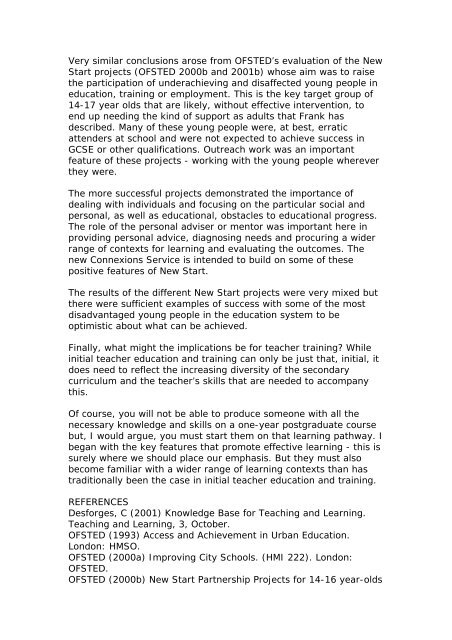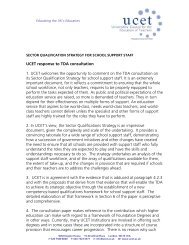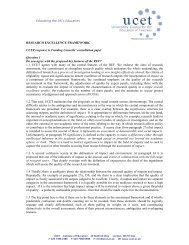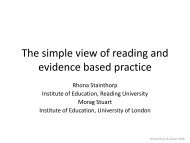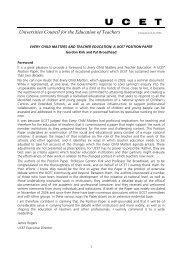The School Curriculum Ten Years Hence - UCET: Universities ...
The School Curriculum Ten Years Hence - UCET: Universities ...
The School Curriculum Ten Years Hence - UCET: Universities ...
Create successful ePaper yourself
Turn your PDF publications into a flip-book with our unique Google optimized e-Paper software.
Very similar conclusions arose from OFSTED’s evaluation of the New<br />
Start projects (OFSTED 2000b and 2001b) whose aim was to raise<br />
the participation of underachieving and disaffected young people in<br />
education, training or employment. This is the key target group of<br />
14-17 year olds that are likely, without effective intervention, to<br />
end up needing the kind of support as adults that Frank has<br />
described. Many of these young people were, at best, erratic<br />
attenders at school and were not expected to achieve success in<br />
GCSE or other qualifications. Outreach work was an important<br />
feature of these projects - working with the young people wherever<br />
they were.<br />
<strong>The</strong> more successful projects demonstrated the importance of<br />
dealing with individuals and focusing on the particular social and<br />
personal, as well as educational, obstacles to educational progress.<br />
<strong>The</strong> role of the personal adviser or mentor was important here in<br />
providing personal advice, diagnosing needs and procuring a wider<br />
range of contexts for learning and evaluating the outcomes. <strong>The</strong><br />
new Connexions Service is intended to build on some of these<br />
positive features of New Start.<br />
<strong>The</strong> results of the different New Start projects were very mixed but<br />
there were sufficient examples of success with some of the most<br />
disadvantaged young people in the education system to be<br />
optimistic about what can be achieved.<br />
Finally, what might the implications be for teacher training? While<br />
initial teacher education and training can only be just that, initial, it<br />
does need to reflect the increasing diversity of the secondary<br />
curriculum and the teacher’s skills that are needed to accompany<br />
this.<br />
Of course, you will not be able to produce someone with all the<br />
necessary knowledge and skills on a one-year postgraduate course<br />
but, I would argue, you must start them on that learning pathway. I<br />
began with the key features that promote effective learning - this is<br />
surely where we should place our emphasis. But they must also<br />
become familiar with a wider range of learning contexts than has<br />
traditionally been the case in initial teacher education and training.<br />
REFERENCES<br />
Desforges, C (2001) Knowledge Base for Teaching and Learning.<br />
Teaching and Learning, 3, October.<br />
OFSTED (1993) Access and Achievement in Urban Education.<br />
London: HMSO.<br />
OFSTED (2000a) Improving City <strong>School</strong>s. (HMI 222). London:<br />
OFSTED.<br />
OFSTED (2000b) New Start Partnership Projects for 14-16 year-olds


